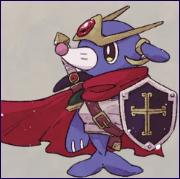|
Tuxedo Catfish posted:Unless you're in a really weird group the GM picks the game and the GM interprets (and, if necessary, adjusts) rules. So while "fault" is kind of accusatory, yes, actually it is the GM's responsibility to either pick a game that works out of the box, or set the guidelines for what's acceptable and what isn't. If only the GM is involved with the process of picking a game system, your group's communication is already rocky as hell and someone's likely to end up pissed off.
|
|
|
|

|
| # ? May 9, 2024 18:49 |
|
SilverMike posted:If only the GM is involved with the process of picking a game system, your group's communication is already rocky as hell and someone's likely to end up pissed off. Almost every gaming group I've ever been in, even the in person ones, is basically someone going "I understand system X well enough to run it, who wants in?" and then recruiting from there. If your top priority is playing with the friends you already have then sure, talk it out and see which of the games you're able to run polls the best, but the reality is that the GM needs a greater degree of system mastery, more books / resources, and spends more time doing things related to the game than anyone else. e: This is even more true now that I know people who aren't completely wedded to D&D and it's quite likely that bugging them to run a system I want would amount to telling them to do a huge research project on top of the usual work of running a game. Tuxedo Catfish fucked around with this message at 04:10 on Sep 28, 2017 |
|
|
|
Tuxedo Catfish posted:Unless you're in a really weird group the GM picks the game and the GM interprets (and, if necessary, adjusts) rules. So while "fault" is kind of accusatory, yes, actually it is the GM's responsibility to either pick a game that works out of the box, or set the guidelines for what's acceptable and what isn't. Oh yes, because every GM is a perfect bastion of mechanics and balance and can instantly sniff out a broken combo and has their pulse on the quickening heart of what is good and what is bad when it comes to gaming. This is just the loving "A Good GM" fallacy again and if you believe that you can go gently caress yourself and the horse you rode in on.
|
|
|
|
Kwyndig posted:Oh yes, because every GM is a perfect bastion of mechanics and balance and can instantly sniff out a broken combo and has their pulse on the quickening heart of what is good and what is bad when it comes to gaming. I didn't say any of that. More specifically, I don't expect GMs not to make mistakes. I do, however, expect them to come up with a solution once the problem arises, because they are vastly better situated to do so than players are.
|
|
|
|
While I don't disagree with Tuxedo Catfish in that game selection tends to lean more towards the GM having a game in mind and then selling it to the players (unless you have a consistent playing group that probably happens more often in live games with IRL friends), I think it's also the responsibility of the GM that if they're aware that the game is vulnerable to min-max shittiness, that they should either think about picking a different game, or have a plan in mind to deal with it. EDIT: and if they weren't aware when it started, but become aware later on, then also have a plan in mind to deal with it then. Like, sure, ProfessorCirno's post about the pregen gunman versus the points-built gunman is entirely valid, but you arguably shouldn't let that kind of divergent character-building happen in the first place. It's like letting half the players in a D&D game roll for stats, while the other half use the standard array, then wondering aloud why the game is busted one way or the other. (and having said all that, attach the standard disclaimer that the designer carries some responsibility for letting their game end up like that in the first place, along with not making it clear enough that GMs shouldn't let players mix-and-match the character-building methods to begin with)
|
|
|
|
Also literally all my time playing tabletop RPGs in the last 5+ years has been as a GM, it's not like I'm saying this out of some sense of entitlement as a player, because I haven't been a player since I was an undergrad student. This is what I expect of myself, and what I've done when I've either messed up and picked out a dodgy game by mistake or knowingly picked something with holes in it because I liked other aspects of the game. For example, if someone picks the fourth dot of Professional Training in my Demon: The Descent game, I'm probably going to take them aside for a chat and explain how much I hate abilities that reward you with extra XP for buying them early, and that I'm going to come up with a homebrew replacement that doesn't do that. I'm not going to tell them "no," I'm not going to tell them to come up with something themselves or to "stay away from that but if you REALLY want it go ahead and justify it with X Y and Z," I'm gonna spitball something reasonable and if my new option is over/under-powered I'll take a second pass and let them respec if needed.
|
|
|
|
Personally, if I'm going to pay upwards of $50 for a book, I want the rules I paid for to actually work. If I need to add my own unwritten rules along the lines of "It says you can choose this option but actually you can't choose this option" for the game to work, what the hell did I pay the designers for? There's a huge difference between "adjusting the game based on our group's needs" and "the rules are straight up lying to you about what a player can be allowed to choose."
|
|
|
|
Tendales posted:Personally, if I'm going to pay upwards of $50 for a book, I want the rules I paid for to actually work. If I need to add my own unwritten rules along the lines of "It says you can choose this option but actually you can't choose this option" for the game to work, what the hell did I pay the designers for? Yeah this is totally reasonable. My point here is way more focused on the balance between a big black box that says "GM + devs" on the one hand and players on the other.
|
|
|
|
FYI, the pro optimization strategy is to make your optimization as far as you can, farther than you really wanted. That way when a GM asks you to tone it down, you just end up toning it back to what you originally wanted anyway, and the GM actually thinks they've done due diligence. Everybody's happy, and everybody wins. 
|
|
|
|
Tendales posted:Personally, if I'm going to pay upwards of $50 for a book, I want the rules I paid for to actually work. If I need to add my own unwritten rules along the lines of "It says you can choose this option but actually you can't choose this option" for the game to work, what the hell did I pay the designers for? Well yeah that's also true. I agree that you shouldn't spend money on a bad game, and that the reason you're paying a game designer to design a game is so that you don't need to do the designing yourself. I was approaching it from the point of having already bought a book.
|
|
|
|
gradenko_2000 posted:Like, sure, ProfessorCirno's post about the pregen gunman versus the points-built gunman is entirely valid, but you arguably shouldn't let that kind of divergent character-building happen in the first place. It's like letting half the players in a D&D game roll for stats, while the other half use the standard array, then wondering aloud why the game is busted one way or the other. Why are characters with such ridiculously divergent in effectiveness allowed by the game in the first place? Optimization is a giant red button that ruins the game, and the game itself dances around and points to it and winks a bunch and goes "dooooon't touch iiiiiiiit!" Except you still have to poke in the general direction of the button, and if you poke too far away, the game kills you. Who looks at that and doesn't blame the game?
|
|
|
|
ProfessorCirno posted:Why are characters with such ridiculously divergent in effectiveness allowed by the game in the first place? This. I've just realised reading this thread that I've always intended (and interpreted) "don't be cheesy" as "don't be the guy that kills god by filling heaven with infiinite ladders or some poo poo, and also probably don't be the guy who can convice people he's the moon, or the guy with a skeleton army" and that some people intend "don't be cheesy" to mean "don't try to be too good at sword fighting". I've never considered myself to be the charop guy, but I'm starting to think that people I've previously gamed with might think that I was doing that just because I like my characters to be experts at things. It's just that, you know, if I want to be a brawler, I'm gonna take brawlin' skills and ignore the exquisite art of the samurai sword. Elector_Nerdlingen fucked around with this message at 05:24 on Sep 28, 2017 |
|
|
|
FMguru posted:The idea of having a system with multiple failure points, and then just throwing it in the lap of the GM saying "if your players actually use the rules to get too much of an advantage, your job is to punish them for their effrontery", is just appalling. Generally speaking, I agree, in that I prefer balance, but if a system sets out deliberately to model some sort of setting or rules scaling that allows in a very forward manner gross imbalances I'm okay with it, because any other player knows exactly what they're getting into. For instance, Champions is not only possible to break, but ludicrously easy to do so; they used to put ultimate killer character concepts right in the main book as a way of explaining that "no, you haven't discovered a loophole--it really is that easy". The idea is that the game is supposed to be able to model the possibilities of a comic-book universe, which runs the gamut from Galactus to the mook that kills Uncle Ben, and while player characters don't range that far, they certainly can be all sorts of levels out of step with one another power-wise ("I'm the Silver Surfer"; "I'm Pastepot Pete"). But the ability to do near anything necessitates that, and the game has always emphasized this as a feature rather than a bug, saying "look, if you can't accept the idea of social contracts, you need to play something else". Nobody ever playing Champions is ambushed by this midway through a game. I don't see that as a failure of design, but an acknowledgement that wanting the full gonzo unbalanced possibilities of comic book universes in a game system will necessitate judgement calls. Rifts (not that I would ever play it again) is another example--GURPS a third. It's the systems that pretend to balance only to ambush you with mechanical collapse once you've invested time and money into them that frustrate me and I think represent true design failures.
|
|
|
|
Xotl posted:The idea is that the game is supposed to be able to model the possibilities of a comic-book universe, which runs the gamut from Galactus to the mook that kills Uncle Ben, and while player characters don't range that far, they certainly can be all sorts of levels out of step with one another power-wise ("I'm the Silver Surfer"; "I'm Pastepot Pete").
|
|
|
|
That's what I was trying to get at: the game outright tells you how to break the game with the starting point limits. In other words, you don't need a points disparity to do it. The game also doesn't rely on point levels alone to enforce power. That's what DC caps, AP caps, rules on what exactly determines a disadvantage and how to eyeball their costs and the like are also for. The system has a variety of ways of getting you close, but never claims to guarantee balance without the aid of players and the GM working in concert, which the books actively state is necessary and make no secret about requiring. It also makes no claim that all 150 point characters are the same (your basic question of "what's the point of points, then" is a good one, however).
|
|
|
|
ProfessorCirno posted:Why are characters with such ridiculously divergent in effectiveness allowed by the game in the first place? I agree with you insofar as the corollary to "make it clear that you're not supposed to mix-and-match character creation methods" is "have just the one method, and make it the one that's good"
|
|
|
|
gradenko_2000 posted:I agree with you insofar as the corollary to "make it clear that you're not supposed to mix-and-match character creation methods" is "have just the one method, and make it the one that's good" But they ARE using the same character creation methods. The problem isn't "the pre-gens are bad," because the problem still exists when Fictional Bob tries to make their character themselves. The problem is that the engine allows for such wildly divergent characters to begin with and then expects you to put them together and challenge them both.
|
|
|
|
Coming from a board gamer perspective, the onus is on the designer to provide a working rule set. Why some role players seem to endorse the philosophy of blaming the end user for obviously broken poo poo is very perplexeing to me. If a board game designer said as such his game would get laughed out of most game groups and discussions. We still talk about the game A Few Acres of Snow because it was by a respected designer but was utterly broken. As for a cause of broken systems, my bet is on that there isn't enough play testing going on. Or that some rpg designers aren't being objective when it comes to listening to feedback. Im hoping it's not that some designers are out of their league and are only able to get stuff published because cultural inertia or some form of grognardian nepotism. Also Gloomhaven does blow away every RPG I've played in the combat and character progression department. But being a board game it lacks the interactive role play elements you get from a typical RPG. Durendal fucked around with this message at 10:47 on Sep 28, 2017 |
|
|
|
Durendal posted:Why some role players seem to endorse the philosophy of blaming the end user for obviously broken poo poo is very perplexeing to me. Because they like Shadowrun/3.x/whatever, and admitting the broken poo poo is because the game is poorly designed would mean admitting the game they like is bad. It's easier to go "well, I don't have this problem at my table, clearly this issue is with the person who has the problem, and not with the game I like."
|
|
|
|
Everyone's well aware Shadowrun is broken. They still want to play it, because they like parts of it and there really hasn't been anything better in the genre. In the last couple years, there have finally been a couple good games (See The Sprawl, and the Runners in the Streets BitD hack) released that can do the setting without the cruft, but they're very different and haven't yet pulled away all the players despite Catalyst being objectively terrible. Getting people to go from simulationism to PbtA can be a hurdle, because it's outside their comfort zone.
|
|
|
|
There's a difference between criticizing a game and saying that the players should not be blamed for it's flaws and saying no one should ever play it.
|
|
|
|
Not blaming the players for the flaws in the system does not absolve them of agency. When they choose to take advantage of those flaws in ways that interfere with an enjoyable game for the rest of the people at the table, that is their choice, not the system's.
|
|
|
|
I was joking before but it is legitimately a "character optimization" tactic in FATAL to abuse the wording of rape checks. You can call for them instantly to interrupt any action. Then you have to roll to see if there's any "damage", and having a greater ""size discrepancy"" means a greater chance of tearing someone open and instantly killing them. So you pick a starting race that has the potential to randomly roll the biggest schlong and go to town. Now, is it good and fair for a player to abuse a poorly-written rule that lets them insta-kill every encounter? The response would probably be "No, but who cares it's FATAL". Because in everyone's mind FATAL isn't worth defending or redeeming. A GM could certainly patch the problem by saying that's not how that particular rule works or players could avoid the problem by not engaging in it, but nobody would bother because nobody plays FATAL anyway. Everyone knows that even if you strip out all the rape and -isms, all you're left with is a bloated, bland rules system and a setting that has no redeeming/tantalizing bits like elf hackers with cyber-eyes or president dragons. There's nothing worth rescuing or working around or fighting against a terribly designed and balanced system to enjoy. There's no enjoyment to be had on any level except maybe pretending to like it to offend all those SJWSSSS. Everyone knows that and nobody tries to pass the buck around on who's fault it is that this is a bad, bad game.
|
|
|
|
Okay, so here's a question, and in recognition that the discussion is heated I assure you that I am asking this in good faith: Is it any ""better"" to have a system where there isn't any kind of choice in how to develop your character at all, beyond the broadest possible strokes? Like, if I pick an Basic D&D Fighter, all of my "character progression" decisions are made for me the moment I write "Fighter" at the top of the sheet. Or even in 5th Edition D&D, where multi-classing (and feats) is technically an optional rule, as soon as I pick Fighter, I'm largely done making choices for my character, except maybe also selecting the level 3 archetype. Is there a strong argument for that way of doing things? That we can prevent "char-op" by removing the ability to do it at all beyond everyone playing a 5e Bard?
|
|
|
|
Within class-based systems, it's a bit inevitable that abusive combinations will crop up the minute you start publishing successive splat books with more and more potential combinations for builds. Most PbtA games allow for multiclassing/dipping into other playbooks for moves, but there's not a constant treadmill of new playbooks that need to be balanced against every prior playbook for potential game-breaking builds.
|
|
|
Kai Tave posted:BESM was the game where the designer, noted thieving writer-bilking rear end in a top hat Mark MacKinnon, absolutely refused to believe that his game had a severe glass ninja problem (it was trivially easy to make characters who were nigh-unhittable with attacks that would explode people on a hit, turning combat into a long series of whiffs until the dice fell in just the right way that someone instantly died) until noted catgirl enthusiast David Pulver literally sat him down and forced him to 1v1 him in imaginary anime character combat. BESM was also the first game I found a literal infinite power exploit in, the infinitely recursive combining subordinate mecha. We all had a good laugh over that. Then Gurren Lagann happened. +1 point for BESM being actually accurate to anime.
|
|
|
|
|
In a vacuum, the issue is simply that the more moving parts a system has, the more likely that the limited playtesting and editing time a TTRPG company can afford will miss a bug. The less options the player has, the easier it is to ensure that all of the possible combinations behave within design spec. Same reason that it's easier to balance a game with a closed card set like Ascension vs MTG. As to if it's better... well, it's more manageable. I like complex systems, but I fully agree that they are nigh impossible to get right. The comparison to AAA video game RPGs with millions of dollars of production budget shipping with systems flaws holds up pretty well, and TTRPGs are a lot harder to patch after release.
|
|
|
|
gradenko_2000 posted:Is it any ""better"" to have a system where there isn't any kind of choice in how to develop your character at all, beyond the broadest possible strokes? Like, if I pick an Basic D&D Fighter, all of my "character progression" decisions are made for me the moment I write "Fighter" at the top of the sheet. You can do that. Some people will find that unsatisfying because they like character building. Some people won't mind. Your greatest pitfall will be avoiding dead levels - players should never feel disappointed to have reached level X because it has crap rewards, but level X+1 has good rewards. This is why "flat" power structure between feats/powers/moves/whatever other name you give to rules containers, where you have a pool of equivalent containers and players can choose the order in which they obtain those containers, works better than a tiered system (where early containers are weak, and late containers are strong) in general. For a linear progression like this you would need to make sure you had a drat flat power structure between containers, but otherwise there's no reason why it wouldn't work. This would also work much better with a very small pool of levels; if you've got 20 levels and your progression is completely fixed, players will be more likely to feel like they're just levelling to get to a specific level's rewards than if a class is five levels "long." Liquid Communism posted:In a vacuum, the issue is simply that the more moving parts a system has, the more likely that the limited playtesting and editing time a TTRPG company can afford will miss a bug. The less options the player has, the easier it is to ensure that all of the possible combinations behave within design spec. Yes, the more complex a system is the more likely to fail it is, but we know it's possible to make sufficiently complex systems that fail gracefully - in the sense that the margin of power between an average character build and a "failed" (under- or over-optimised) character build is manageably-sized - since there are several systems that manage. Lemon-Lime fucked around with this message at 13:53 on Sep 28, 2017 |
|
|
|
gradenko_2000 posted:Or even in 5th Edition D&D, where multi-classing (and feats) is technically an optional rule, as soon as I pick Fighter, I'm largely done making choices for my character, except maybe also selecting the level 3 archetype. This is a problem, because while they're "technically" optional systems, the game feels very incomplete without them. But since they're optional systems the D&D Dev team doesn't need to balance them. And their mere existence means that most of the class and archetype defining abilities are locked away as level 18+ capstones.
|
|
|
|
Lemon-Lime posted:This is why "flat" power structure between feats/powers/moves/whatever other name you give to rules containers, where you have a pool of equivalent containers and players can choose the order in which they obtain those containers, works better than a tiered system (where early containers are weak, and late containers are strong) in general. Ah ha! So which RPG structures its abilities the same DOTA 2 and Heroes of the Storm does? Kurieg posted:This is a problem, because while they're "technically" optional systems, the game feels very incomplete without them. But since they're optional systems the D&D Dev team doesn't need to balance them. And their mere existence means that most of the class and archetype defining abilities are locked away as level 18+ capstones. Yes, okay, I acknowledge that.
|
|
|
|
Liquid Communism posted:Not blaming the players for the flaws in the system does not absolve them of agency. When they choose to take advantage of those flaws in ways that interfere with an enjoyable game for the rest of the people at the table, that is their choice, not the system's. I challenged you earlier to give a clear line where things should be drawn. As I mentioned it is fine to say in D&D 3.X that Pun-Pun is out as is the Ur-Priest/Nar Demonbinder. But until you can give a clear and consistent way of describing "flaws in the system" and "interfere with an enjoyable game for the rest of the people at the table" you are demanding either a group that knows each other extremely well or for the players and not just the characters to be telepathic. And bear in mind that the easiest point for the table to agree on is everyone building a character who is an expert in what they do. I expect things from my players. Telepathy isn't on the list. I also expect things from my game designers. Allowing players to play together when they set out to play the game based on the rulebooks they have been given is on that list. And as a GM I also expect things from myself. Getting my players on the same page is a part of it - and a part of that is making sure that they don't end up with characters that are unfun for themselves and each other. And they don't end up in a maze of twisty passages all alike at character creation because I'm wanting them to pick up telepathically what my own personal ideas of the power level should be.
|
|
|
|
gradenko_2000 posted:Okay, so here's a question, and in recognition that the discussion is heated I assure you that I am asking this in good faith: In the Shadowrun example earlier, the Street Samurai and Gunbunny would each be about on even footing, assuming competently-designed classes. The more fiddling you allow with it - and spell lists are one of the biggest trouble spots - the more charop issues you'll run into. But yes, fewer moving parts means fewer balance issues. I don't think it's possible to design a point-buy system that doesn't have fairly severe optimization break-points.
|
|
|
|
gradenko_2000 posted:Yes, okay, I acknowledge that. There's also the problem that introducing feats means that you now have to choose between ASIs and Feats when they're avaliable, and there is always a mathematically 'wrong' choice between the two. Forcing players to choose between two mutually exclusive types of character advancement when one of those two options is 'bad', but which one is 'bad' changes depending on hundreds of other factors that require a certain amount of metagame knowledge to discern is the worst part of 5e's game design and it bothers me that it also infected Pugmire, except in pugmire all of your class features are also feats, do you want access to higher level spells? More spells of your current level? Or the intelligence score to actually cast higher level spells? You only get one.
|
|
|
|
gradenko_2000 posted:Ah ha! So which RPG structures its abilities the same DOTA 2 and Heroes of the Storm does? HotS has obvious talent tiering so I don't think you want to bring it up here.  Apocalypse World has no tiering (whereas Dungeon World does, but it only has two tiers, levels 1-5 and 6-10). If you want a crunchy, tactical combat game that has no tiering, Battle Century Z, since it's point-buy. Most point-buy systems have minimal to no tiering, really, since they don't have "levelling up" in the D&D way.
|
|
|
|
neonchameleon posted:I challenged you earlier to give a clear line where things should be drawn. As I mentioned it is fine to say in D&D 3.X that Pun-Pun is out as is the Ur-Priest/Nar Demonbinder. But until you can give a clear and consistent way of describing "flaws in the system" and "interfere with an enjoyable game for the rest of the people at the table" you are demanding either a group that knows each other extremely well or for the players and not just the characters to be telepathic. And bear in mind that the easiest point for the table to agree on is everyone building a character who is an expert in what they do. There's no telepathy involved, quit being silly. It's a pretty simple matter of player communication when building characters to avoid 'Oh, I brought this guy whose only skill is pistols, but I have double the dicepool any of you do in your primary abilities, hope you can cover for me in everything else and don't mind me being baggage for anything that isn't a shooting match'.
|
|
|
|
gradenko_2000 posted:Okay, so here's a question, and in recognition that the discussion is heated I assure you that I am asking this in good faith: Absolutely not.
|
|
|
gradenko_2000 posted:Okay, so here's a question, and in recognition that the discussion is heated I assure you that I am asking this in good faith:
|
|
|
|
|
gradenko_2000 posted:Okay, so here's a question, and in recognition that the discussion is heated I assure you that I am asking this in good faith: It removes an axis of movement from the power equation. Which should make balancing much easier. It certainly makes character design faster. But you are doing so at the cost of a major aesthetic that the majority of modern players enjoy.
|
|
|
|
The big problem I have with shoring and the "good GM" is that 90% of the time it's an unspoken assumption that the GM will just ignore the rules rather than fixing them. If the players are beating the monster too easily, they might say the GM is supposed to multiply the hit points by X the factor they have somehow calculated, but what they are actually expected to do is to throw the HP system out completely and declare the monster dead when it "feels right". Which is a complete failure of game design. That said, I think character imbalance is accepted because most RPGs have heavily unbalanced involvement anyway because of the "co-op chess" fallacy (ie, that you could make chess a fun co-op game by giving every player control of 1 piece). It's telling that many of the board games based on RPG-like tactical systems, like Dungeon Saga, end up criticised because of this.
|
|
|
|

|
| # ? May 9, 2024 18:49 |
|
Durendal posted:Coming from a board gamer perspective, the onus is on the designer to provide a working rule set. Why some role players seem to endorse the philosophy of blaming the end user for obviously broken poo poo is very perplexeing to me. If a board game designer said as such his game would get laughed out of most game groups and discussions. We still talk about the game A Few Acres of Snow because it was by a respected designer but was utterly broken. I'm from the same background but I think an element missing is that there simply aren't a lot of actual well designed and balanced RPGs, so your options are often to play something suboptimal (especially if you're looking for crunch) or to not play an RPG at all. Unlike modern board games there is simply no money in tabletop RPGs so the interest in driving design forward has to come from amateurs and fans most of the time, and that obviously has little oversight. It doesn't help that most people aren't actually sure what makes an RPG balanced aside from "make everyone's damage more or less similar unless they're a healer/tank type", which is how you wind up with situations like wizards or the setting-appropriate wizard equivalent being able to solve the game's non-combat portions through divination or other such bullshit. This makes playtesting difficult compared to board games where the objective (win) is very clear, and you aren't really able to problem solve in the abstract ways RPGs revel in.
|
|
|
































